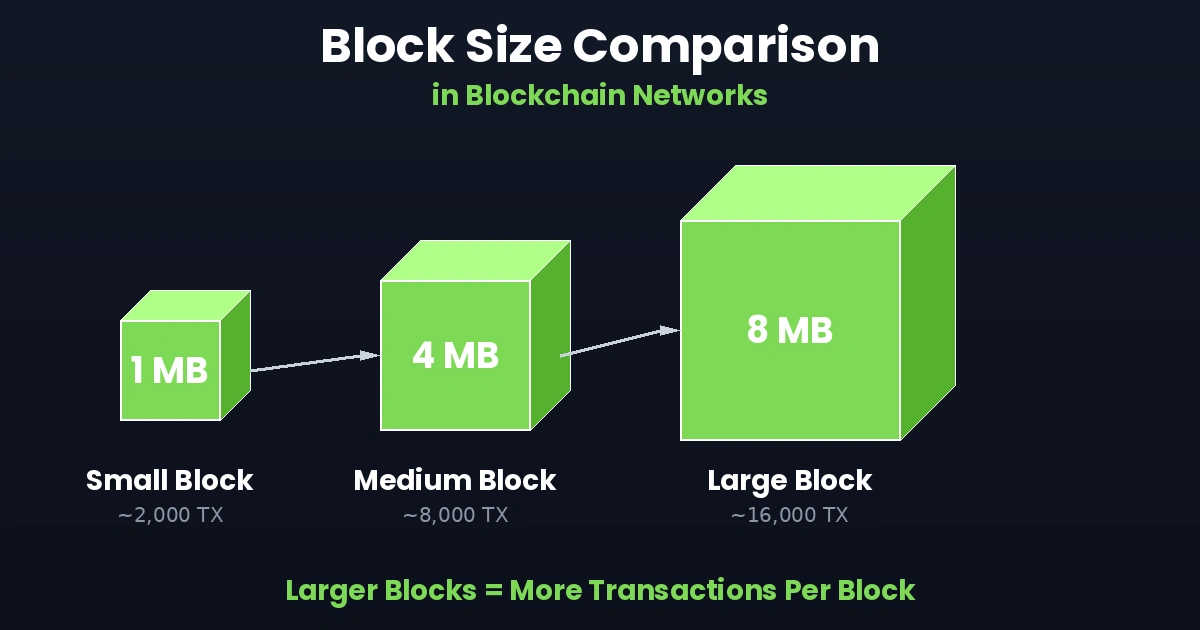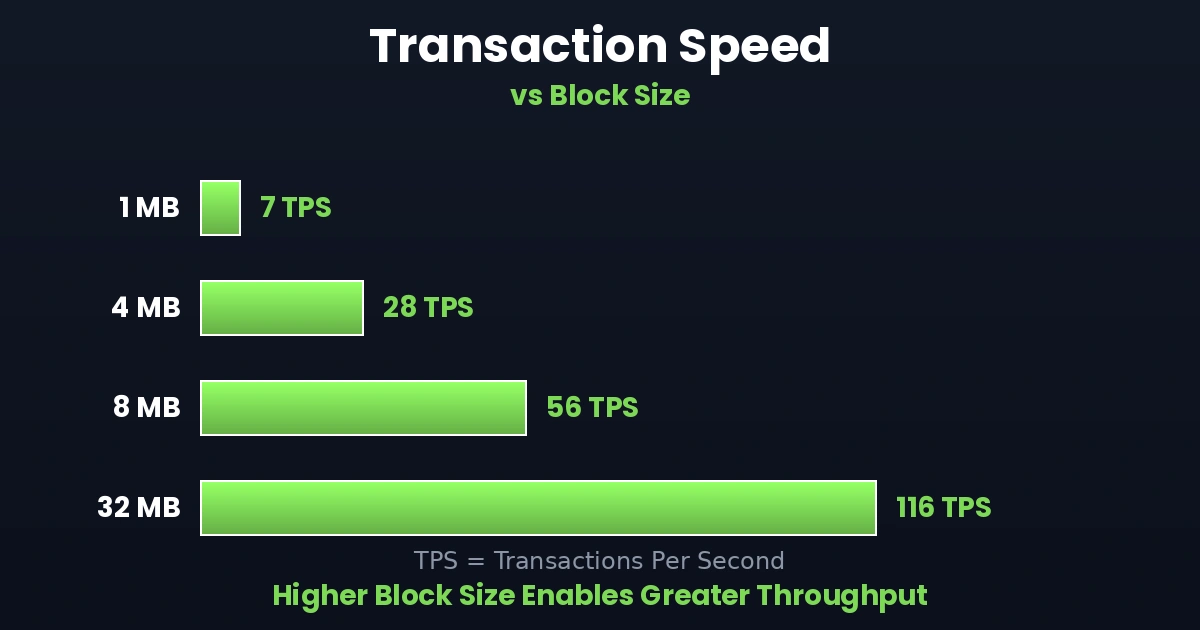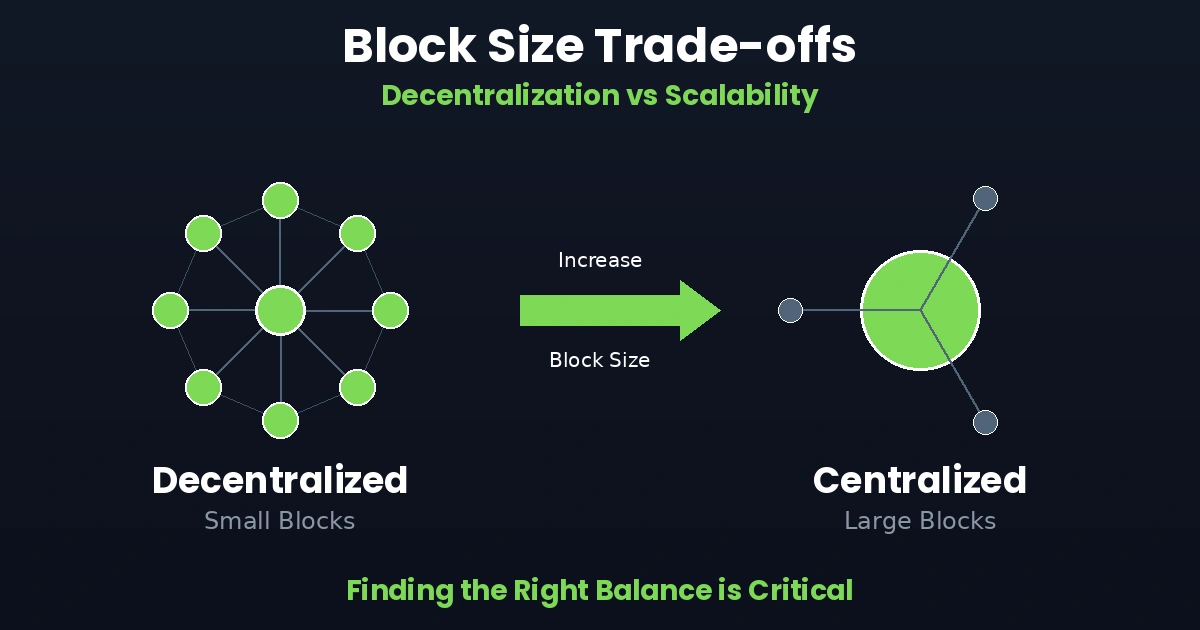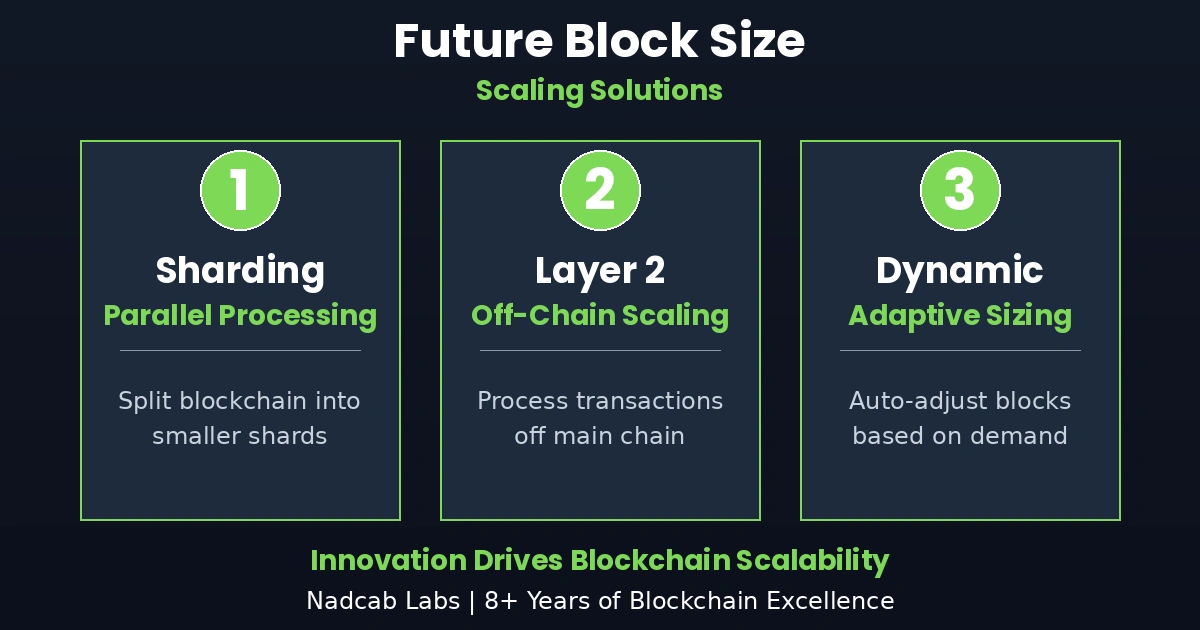Key Takeaways
- Block size refers to the maximum data capacity of each block in a blockchain network, directly affecting how many transactions can be processed at once.
- Larger block sizes increase transaction throughput but require more computational resources, potentially leading to network centralization.
- Bitcoin uses a 1 MB block size limit, while Bitcoin Cash increased it to 32 MB to handle more transactions per block.
- Block propagation time increases with larger blocks, which can affect network synchronization and security.
- Future solutions like sharding, Layer 2 protocols, and dynamic block sizing offer promising alternatives to simply increasing block size.
- Choosing the right block size requires balancing scalability needs against decentralization and security requirements.
When you start building blockchain applications, one of the first technical decisions you will face involves block size configuration. This parameter might seem straightforward at first glance, but it touches nearly every aspect of how your blockchain network performs, scales, and maintains its integrity over time.
At Nadcab Labs, we have spent over eight years working with organizations across industries to implement blockchain solutions. During this time, we have seen how block size decisions made early in development can shape the entire trajectory of a project. Some teams have had to completely restructure their networks because they did not fully understand the implications of their initial block size choices.
This guide walks you through everything you need to know about block size from both an execution and development perspective. We will cover the technical fundamentals, examine real world trade-offs, and share practical insights that come from hands-on implementation experience.
Understanding Block Size: The Foundation
Block size is the maximum amount of data that a single block can contain in a blockchain network. Think of each block as a container that holds transaction records. The size of this container determines how many transactions you can fit inside before sealing it and adding it to the chain.
In technical terms, block size is measured in bytes or megabytes. Bitcoin, the original blockchain implementation, set its block size limit at 1 megabyte. This means that regardless of how many transactions are waiting to be processed, only those that fit within that 1 MB constraint can be included in any given block.
The concept becomes clearer when you understand what actually goes into a block. Each block contains a header section with metadata like timestamps and cryptographic hashes, plus the actual transaction data. The cryptographic hash functions used in these headers ensure data integrity but also consume some of the available space. The remaining capacity determines how many user transactions the block can accommodate.
According to Wikipedia’s documentation on cryptocurrency block sizes, this parameter has been one of the most debated aspects of blockchain design, leading to significant network forks and community divisions over the years.
Block Size Across Different Blockchain Networks

Different blockchain networks have taken varying approaches to block size, each reflecting their priorities and use cases. The table below shows how major networks have configured this parameter.
| Blockchain Network | Block Size Limit | Block Time | Approx. TPS |
|---|---|---|---|
| Bitcoin | 1 MB (4 MB with SegWit) | 10 minutes | 7 |
| Bitcoin Cash | 32 MB | 10 minutes | 116 |
| Ethereum | Dynamic (Gas Limit) | 12 seconds | 15-30 |
| Litecoin | 1 MB | 2.5 minutes | 56 |
| Bitcoin SV | Unlimited (practical ~4 GB) | 10 minutes | 1000+ |
These differences are not arbitrary. Each network made deliberate choices based on their target applications. Bitcoin prioritized decentralization and security by keeping blocks small. Bitcoin Cash prioritized transaction throughput by increasing block size substantially. Ethereum took a different approach entirely by using gas limits instead of fixed byte sizes.
How Block Size Directly Impacts Transaction Processing
The relationship between block size and transaction processing is straightforward in principle but complex in practice. Larger blocks can hold more transactions, which means more transactions get confirmed with each new block added to the chain.

Consider this practical scenario. If your blockchain produces one block every ten minutes with a 1 MB size limit, and the average transaction size is 500 bytes, you can process roughly 2,000 transactions per block. That translates to about 3.3 transactions per second. If you increase the block size to 8 MB, you can theoretically process 16,000 transactions per block, or about 26 transactions per second.
But real world performance rarely matches these theoretical numbers. Transaction sizes vary based on their complexity. A simple payment might be 250 bytes, while a transaction involving multiple inputs and outputs could exceed 1,000 bytes. Smart contract interactions on platforms like Ethereum can require significantly more data.
Our team at Nadcab Labs has observed through numerous blockchain development projects that actual throughput depends heavily on the types of transactions your network handles. A payment-focused blockchain will see different performance characteristics than one designed for complex decentralized applications.
The Block Propagation Challenge
One factor that developers often underestimate is block propagation time. When a miner or validator creates a new block, that block must spread across the entire network before other participants can build on it. Larger blocks take longer to transmit and verify.
The propagation process involves multiple steps. First, the creating node must serialize the block data and begin transmitting it to connected peers. Each receiving node must download the complete block, deserialize it, validate all transactions, verify the proof of work or stake, and then begin relaying to its own peers. This chain of operations repeats across thousands of nodes worldwide.
This creates a subtle but significant problem. If block propagation takes too long, different parts of the network might start working on different chain tips simultaneously. This increases the rate of orphaned blocks and can lead to temporary chain splits. In extreme cases, it can undermine network security by making attacks easier to execute.
Research has shown that block propagation time scales roughly linearly with block size under normal conditions. A 1 MB block might propagate across a well-connected network in a few seconds. An 8 MB block could take eight times as long. During periods of network congestion or when nodes have limited bandwidth, these delays can compound significantly.
Block Size Impact on Network Metrics
Understanding how block size affects various network parameters helps developers make informed decisions during the planning phase.
| Network Metric | Small Blocks (1 MB) | Large Blocks (32 MB) |
|---|---|---|
| Transaction Throughput | Lower capacity per block | Higher capacity per block |
| Block Propagation Time | Faster network sync | Slower network sync |
| Storage Requirements | Grows slowly over time | Grows rapidly over time |
| Node Hardware Needs | Consumer grade sufficient | Enterprise grade preferred |
| Network Decentralization | More accessible participation | Barriers to entry increase |
| Transaction Fees | Higher during congestion | Generally lower |
The Decentralization Trade-off
Perhaps the most contentious aspect of block size debates involves its impact on network decentralization. This is not merely a philosophical concern. It has real implications for security, censorship resistance, and long-term network viability.

Running a full node on a blockchain requires storing the complete transaction history and validating new blocks as they arrive. Larger blocks mean faster growing storage requirements. A blockchain with 32 MB blocks will accumulate data roughly 32 times faster than one with 1 MB blocks, assuming similar block times.
After a few years of operation, a large-block blockchain might require multiple terabytes of storage and substantial bandwidth to stay synchronized. This prices out casual participants who want to verify transactions independently. When fewer people run full nodes, the network becomes more centralized around those who can afford the infrastructure.
The security implications are significant. With fewer independent validators, collusion becomes easier. The network becomes more vulnerable to regulatory pressure since there are fewer points of enforcement resistance. These concerns drove much of the opposition to increasing Bitcoin’s block size and ultimately led to the creation of Bitcoin Cash as a separate network.
From a technical standpoint, decentralization affects more than just governance. It impacts network resilience against failures and attacks. A network with thousands of independent nodes spread across different jurisdictions, internet providers, and hardware configurations can survive events that would cripple a more centralized system. Natural disasters, regulatory actions, or infrastructure failures in one region have limited impact when nodes operate globally.
Block Structure and How Size Gets Consumed
To make informed decisions about block size, developers need to understand what actually fills up a block. The internal structure matters because not all of the block size is available for user transactions.
Every block starts with a header containing critical metadata. The header includes the hash of the previous block, which creates the chain structure. It also includes a timestamp, a merkle root summarizing all transactions in the block, and consensus-specific data like the nonce in proof of work systems.
Block headers are typically small, around 80 bytes in Bitcoin. But they are fixed overhead that reduces available transaction space. More significantly, each transaction carries its own overhead beyond just the payment amount. Transaction inputs reference previous outputs, digital signatures prove authorization, and output scripts define spending conditions.
The implementation of elliptic curve cryptography in blockchain systems means that signatures alone can consume 70 to 100 bytes per input. A transaction spending multiple previous outputs will be larger than a simple single-input transaction, even if the payment amounts are identical.
Optimize Your Blockchain Performance
Need expert guidance on block size configuration for your blockchain project? Nadcab Labs brings 8+ years of hands-on development experience to help you build scalable, secure networks.
Transaction Lifecycle and Block Size Considerations
Understanding how transactions move from creation to confirmation helps clarify why block size matters at each stage. The lifecycle involves several phases, each affected by block capacity constraints.
When a user creates a transaction, it first goes to their local node for initial validation. The node checks that the transaction is properly formatted and that the referenced outputs exist and are unspent. Valid transactions then broadcast to the network and enter the memory pool of receiving nodes.
The memory pool, or mempool, holds unconfirmed transactions waiting to be included in a block. When block space is scarce relative to transaction demand, the mempool grows. Miners or validators typically prioritize transactions offering higher fees, so low-fee transactions can wait for hours or even days during congestion.
Once a transaction is included in a block and that block is added to the chain, the transaction achieves its first confirmation. Additional blocks built on top provide more confirmations, increasing certainty that the transaction is permanent. For high-value transfers, recipients often wait for multiple confirmations before considering payment complete.
Block size affects this lifecycle primarily at the inclusion stage. Larger blocks clear the mempool faster during high-demand periods. Smaller blocks create bottlenecks that drive up fees and confirmation times. The choice of block size essentially sets the ceiling for how much transaction activity the network can handle before congestion effects appear.
Practical Implementation: Setting Block Size Parameters
For developers building custom blockchains or working with configurable networks, setting the right block size involves several practical considerations beyond theoretical throughput calculations.
First, analyze your expected transaction patterns. What types of operations will your network handle? Payment transfers have different size profiles than smart contract calls. Hyperledger implementations for enterprise use cases might have very different requirements than public cryptocurrency networks.
Second, consider your target node operators. If you need maximum decentralization with nodes running on consumer hardware, keep blocks small enough that synchronization remains manageable on standard internet connections and storage devices. If your network serves a consortium of known participants with enterprise infrastructure, larger blocks become more practical.
Third, plan for growth. Transaction volumes typically increase over time as adoption grows. Starting with blocks that are too small creates scaling headaches later, but starting too large limits who can participate from the beginning. Many networks launch with conservative block sizes and increase them through governance processes as needed.
Historical Context: The Bitcoin Block Size Wars
No discussion of block size would be complete without acknowledging the intense debates that shaped how we think about this parameter today. The Bitcoin block size controversy from 2015 to 2017 divided the community and resulted in network forks that created entirely new cryptocurrencies.
The original 1 MB limit was added to Bitcoin early in its history as a spam prevention measure. Satoshi Nakamoto included it to prevent attackers from flooding the network with enormous blocks that could disrupt operation. For years, this limit was theoretical since actual blocks were much smaller than the cap.
As Bitcoin usage grew, blocks began approaching the 1 MB ceiling regularly. Transaction fees rose as users competed for limited block space. The community split between those who wanted to increase the limit and those who preferred keeping blocks small while scaling through other methods.
The debate touched on fundamental questions about Bitcoin’s purpose. Was it primarily a settlement layer for high-value transfers where users could afford fees? Or should it remain accessible for small everyday payments? Different answers led to different conclusions about appropriate block sizes.
Ultimately, Bitcoin implemented Segregated Witness, which effectively increased block capacity to about 4 MB for certain transaction types without changing the nominal size limit. Those who wanted larger blocks forked the network to create Bitcoin Cash with an 8 MB limit, later increased to 32 MB.
Comparing Scaling Approaches
Block size is just one approach to blockchain scaling. Modern networks employ various strategies that can work independently or in combination.
| Scaling Method | How It Works | Advantages | Limitations |
|---|---|---|---|
| Larger Block Size | Increases data capacity per block | Simple to implement | Centralization risk |
| Shorter Block Time | Produces blocks more frequently | Faster confirmations | More orphaned blocks |
| Layer 2 Solutions | Processes transactions off main chain | Massive throughput gains | Added complexity |
| Sharding | Divides network into parallel chains | Linear scaling with shards | Cross-shard coordination |
| Transaction Compression | Reduces individual transaction size | More transactions per block | Protocol changes needed |
The zero knowledge proof technology has emerged as particularly promising for scaling. ZK-rollups can batch thousands of transactions into compact proofs that occupy minimal block space while maintaining security guarantees.
Security Implications of Block Size Choices
Block size affects security in ways that extend beyond the centralization concerns already discussed. Larger blocks create more attack surface for certain exploit types while potentially improving resilience against others.
One security consideration involves selfish mining attacks, where a miner withholds discovered blocks to gain competitive advantage. With larger blocks and longer propagation times, the window for such attacks expands. Honest miners waste more work building on what turns out to be an orphaned chain tip.
Network-level attacks also change with block size. A denial of service attack that floods the network with valid but spammy transactions becomes more expensive when blocks are small since the attacker must pay competitive fees for limited space. Large blocks make such spam attacks cheaper to execute, though still not free.
On the positive side, larger blocks can improve security against certain timing-based attacks by providing more transaction throughput during crisis periods. If your network faces a sudden surge of legitimate activity, having headroom in block capacity prevents degraded service.
Proper blockchain identification mechanisms and validation rules matter regardless of block size. But the size parameter influences the cost-benefit calculations that potential attackers make when considering various exploit strategies.
Future Directions in Block Size Management
The blockchain industry continues developing new approaches to the block size question. Rather than fixed limits, adaptive mechanisms that respond to network conditions show particular promise.

Dynamic block sizing allows the network to automatically adjust capacity based on demand. When transaction volume increases, blocks can grow to accommodate more activity. When demand falls, blocks shrink to avoid unnecessary storage overhead. Several networks have implemented variations of this approach with different triggering mechanisms.
The Solana blockchain development model takes an entirely different approach, optimizing for throughput from the ground up with parallel transaction processing. Rather than focusing on block size as the primary scaling lever, Solana’s architecture allows thousands of transactions per second through hardware-optimized validation.
Cross-chain interoperability solutions offer another path forward. Instead of one chain handling all activity, specialized chains can focus on different use cases. High-volume payment networks might use large blocks while settlement layers maintain smaller blocks for security. Bridges and atomic swaps connect these specialized chains.
Platforms like Ripple demonstrate enterprise-focused approaches where network architecture optimizes for specific business requirements rather than general-purpose computing.
Real World Performance Benchmarks
Theoretical calculations only tell part of the story. Real world blockchain performance depends on many factors beyond raw block size, including network topology, client software efficiency, and hardware capabilities of participating nodes.
In testing environments at Nadcab Labs, we have observed that increasing block size delivers diminishing returns past certain thresholds. Doubling block size does not double effective throughput because propagation delays, validation time, and mempool management all create overhead that scales non-linearly.
Networks optimized for specific transaction types can achieve better results than general-purpose chains at any block size. If you know your transactions will follow predictable patterns, client software can be tuned to validate them faster. This is one reason why private and consortium blockchains often outperform public networks despite using similar underlying technology.
Geographic distribution of nodes matters significantly. A network with nodes concentrated in one data center will propagate blocks much faster than one with global distribution. This creates tension between decentralization goals and performance optimization that block size alone cannot resolve.
Our experience at Nadcab Labs shows that the relationship between block size and real-world performance is highly dependent on the consensus mechanism employed. Proof of work networks behave differently than proof of stake systems. Delegated consensus models introduce yet another set of dynamics. Each mechanism has its own sweet spot where block size, block time, and network topology work together optimally.
Client software implementation quality also plays a surprisingly large role. Two networks with identical block sizes can show dramatically different performance if one uses optimized transaction validation code and efficient database indexing. Before concluding that block size is your bottleneck, ensure your client software is not leaving performance on the table.
Making the Right Choice for Your Project
After examining all these factors, how should you approach block size decisions for your own blockchain project? The answer depends on your specific requirements and constraints.
Start by defining your non-negotiables. If maximum decentralization is essential, accept lower throughput and plan to scale through Layer 2 or other mechanisms. If you need high throughput for a known set of participants, larger blocks become viable.
Consider your growth trajectory. A blockchain that starts small and grows organically has different needs than one launching to support an existing user base from day one. Build in governance mechanisms that allow parameter adjustments without contentious hard forks.
Engage with experienced developers who have shipped production blockchain systems. Theory and practice often diverge in blockchain engineering. The team at Nadcab Labs has worked through these decisions dozens of times across different industries and use cases. That pattern recognition helps avoid common pitfalls.
Test extensively before launching. Set up private networks with realistic transaction loads and measure actual performance. Stress test with adverse conditions like network partitions and node failures. Block size choices that look good on paper can fail under real-world pressure.
Documentation matters more than many teams realize. Record why you chose specific parameters and what assumptions underlie those choices. When conditions change or team members rotate, having clear reasoning helps future decision makers understand the context. At Nadcab Labs, we maintain detailed architecture decision records for all client projects precisely because these foundational choices have long-lasting implications.
Consider implementing monitoring from day one. Track actual block utilization, propagation times, and orphan rates. This data proves invaluable when evaluating whether your initial block size choice remains appropriate as the network evolves. Proactive adjustments based on real metrics prevent crises before they emerge.
Summary Statement
Block size represents one of the most fundamental trade-offs in blockchain design. Larger blocks enable higher transaction throughput but require more resources from network participants, potentially reducing decentralization. Smaller blocks maintain accessibility but can create bottlenecks during high demand. The right choice depends entirely on your network’s purpose, target participants, and long-term vision. Modern blockchain development increasingly combines multiple scaling approaches rather than relying on block size alone.
Why Work with Nadcab Labs
Block size configuration is just one of hundreds of technical decisions that go into building a successful blockchain solution. Getting these details right requires experience that only comes from shipping real systems into production environments.
Nadcab Labs has spent over eight years helping organizations across finance, supply chain, healthcare, and other industries implement blockchain technology. Our team has worked with everything from small pilot projects to enterprise-scale deployments handling millions of transactions.
We understand that block size is rarely an isolated decision. It connects to consensus mechanism selection, client software architecture, node deployment strategy, and business process integration. Our holistic approach ensures that all these pieces work together coherently.
Whether you are exploring blockchain for the first time or optimizing an existing implementation, we bring practical expertise grounded in real-world results. Contact us to discuss how our team can support your blockchain development goals.
Frequently Asked Questions
Bitcoin maintains a base block size limit of 1 megabyte, though the implementation of Segregated Witness in 2017 effectively allows blocks up to approximately 4 MB when transactions use the SegWit format. This hybrid approach was a compromise between those wanting larger blocks and those concerned about decentralization impacts. The actual average block size varies based on transaction types included. Most Bitcoin blocks today range between 1.2 and 1.5 MB when accounting for SegWit data.
Larger blocks require more computational resources to process, validate, and store. As block sizes increase, the hardware requirements for running a full node grow proportionally. Storage needs expand faster since every block adds to the permanent chain history. Bandwidth requirements increase because larger blocks must be downloaded and uploaded for network synchronization. Over time, these escalating requirements price out individual participants and smaller organizations, leaving only well-funded entities capable of operating nodes.
Transaction fees in most blockchain networks operate through market dynamics where users bid for limited block space. When block capacity is constrained relative to transaction demand, users must offer higher fees to ensure timely confirmation. Larger blocks provide more space, reducing competition and generally lowering fees during normal operation. However, this relationship is not linear. Network effects, miner behavior, and transaction complexity all influence actual fee levels independent of raw block size.
Yes, block size can be modified after launch through network upgrades, though the process varies by blockchain. Changes typically require either a hard fork where all nodes must upgrade to new rules, or a soft fork where new rules are backward compatible. The governance mechanisms differ between networks. Some use formal voting by token holders or miners. Others rely on rough consensus among developers and node operators. Bitcoin Cash has changed its block size multiple times since forking from Bitcoin.
Layer 2 solutions are protocols built on top of base blockchains that handle transactions off the main chain while inheriting its security guarantees. Examples include the Lightning Network for Bitcoin and various rollup implementations for Ethereum. These systems reduce demand for main chain block space by batching many transactions into single on-chain settlements. Layer 2 effectively multiplies throughput without requiring block size increases, offering an alternative scaling path that preserves base layer decentralization.
Enterprise and consortium blockchains typically operate with known participants running standardized infrastructure. This controlled environment allows for larger block sizes without the centralization concerns that affect public networks. Since all nodes meet minimum hardware specifications and connect through reliable networks, propagation delays are predictable and manageable. Many enterprise platforms like Hyperledger Fabric use configurable block sizes that administrators can tune based on their specific throughput requirements and infrastructure capabilities.
Reviewed & Edited By

Aman Vaths
Founder of Nadcab Labs
Aman Vaths is the Founder & CTO of Nadcab Labs, a global digital engineering company delivering enterprise-grade solutions across AI, Web3, Blockchain, Big Data, Cloud, Cybersecurity, and Modern Application Development. With deep technical leadership and product innovation experience, Aman has positioned Nadcab Labs as one of the most advanced engineering companies driving the next era of intelligent, secure, and scalable software systems. Under his leadership, Nadcab Labs has built 2,000+ global projects across sectors including fintech, banking, healthcare, real estate, logistics, gaming, manufacturing, and next-generation DePIN networks. Aman’s strength lies in architecting high-performance systems, end-to-end platform engineering, and designing enterprise solutions that operate at global scale.




